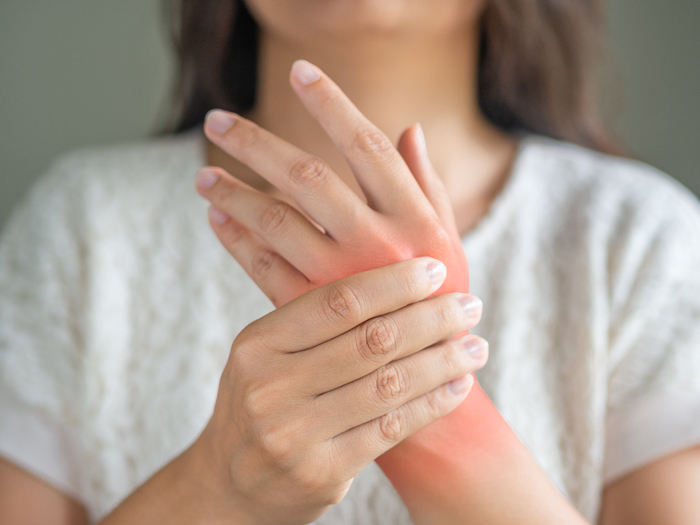Rheumatoid Arthritis Treatment & Diagnostics in Sadashiv Peth, Pune
Rheumatoid Arthritis
Rheumatoid arthritis (RA) is an autoimmune condition that causes pain and damage to joints all over the body. It can also affect other body systems such as the lungs, blood vessels, eyes, heart, and skin.
What is Rheumatoid Arthritis?
RA occurs when the body’s immune system starts attacking the body’s tissues mistakenly. Due to this, the joint lining becomes inflamed and swollen, causing pain and discomfort. This autoimmune condition is symmetrical, i.e. it affects both sides of the body, which is why it is different from other types of arthritis.

What Are the Symptoms of Rheumatoid Arthritis?
Symptoms of RA occur in two stages - flares and remission. The symptoms occur in the flares stage whereas disappear completely during the remission stage. Symptoms of RA include -
- Joint stiffness, especially after waking up in the morning or inactivity
- Joint pain
- Fatigue
- Fever
- Tenderness in joints
- Swollen joints
- Loss of appetite
- Deformities
- Loss of function in the affected joints
What Are the Causes of Rheumatoid Arthritis?
RA is an autoimmune condition. In normal cases, our body’s immune system is responsible for protecting it from infections or diseases. In RA, the immune system goes haywire and mistakenly starts attacking the healthy tissues in the joints. This leads to pain, swelling, and inflammation in the joints. It also affects other body parts. The exact cause that leads to the onset of RA isn’t known. However, genetic components may be at play. Genes aren’t directly responsible for causing RA, however, it makes some individuals more susceptible to infections caused by certain bacteria or viruses, in turn, triggering RA.
When to See a Doctor?
Request an appointment at Apollo Spectra Hospitals, Pune
Call 1860-500-2244 to book an appointment
What are the Risk Factors of Rheumatoid Arthritis?
Certain factors can increase the risk of RA, such as -
- Gender - Women are more likely to get RA, as compared to men.
- Family history - A person is more likely to get RA if a member of their family has it.
- Obesity - If a person is overweight or obese, they are at a higher risk of developing RA.
- Age - Typically, the onset of RA has been observed in middle-aged people. However, it may begin at any age.
- Smoking - The risk of RA increases with smoking cigarettes, especially if a person is genetically predisposed to the condition. The severity of RA is also higher in those who smoke.
How is Rheumatoid Arthritis Diagnosed?
It can be difficult to diagnose RA since several lab tests need to be performed to confirm the diagnosis. Your doctor will first ask you about your medical history and symptoms they will also perform a physical examination of the affected joints, wherein they will check for a range of motion, joint function, swelling, redness, tenderness, warmth, reflexes, and muscle strength.
If RA is suspected, you may be referred to a rheumatologist. There is not one single test that can be performed to confirm RA. Several blood tests such as the rheumatoid factor test, Anti-citrullinated protein antibody test, antinuclear antibody test, C-reactive protein test, and erythrocyte sedimentation rate are performed to diagnose RA.
We TreHow can at Rheumatoid Arthritis?
RA cannot be cured. However, there are various treatment options to manage the condition. These options include -
- Medications - Your doctor will prescribe certain medications such as NSAIDs, steroids, biologic agents, or conventional DMARDs, based on your symptoms and how long you’ve had the condition.
- Therapy - Individuals with RA may undergo physical or occupational therapy, wherein they can learn how to perform exercises to keep the joints flexible and perform daily tasks so that there isn’t too much stress on the joints.
- Surgery - If other non-surgical treatments fail to work, surgery may be recommended to repair the damaged joints and also restore mobility and function in the joint.
How Can We Prevent Rheumatoid Arthritis?
RA cannot be prevented completely, however, the following tips may help reduce the risk of it -
- Quit smoking
- Limiting alcohol consumption
- Improving oral health
- Maintain ideal weight
- Staying active
- Increasing intake of fish
- Minimizing bone loss
Conclusion
A is a chronic, autoimmune condition that cannot be cured. Early treatment is essential to delay severe joint damage. With the appropriate treatment options, RA is manageable.
Several complications associated with RA include -
- Osteoporosis
- Dry mouth and eyes
- Carpal tunnel syndrome
- Lung disease
- Infections
There are various procedures such as tendon repair, Synovectomy, joint fusion, or total joint replacement that are performed as surgery for RA.
To manage RA, individuals can make certain lifestyle changes such as regular low-impact exercise, a well-balanced diet, adequate rest, and applying heat or cold to the affected areas.
Treatments
Our Top Specialities
NOTICE BOARD
CONTACT US
CONTACT US
 Book Appointment
Book Appointment


.svg)
.svg)
.svg)
.svg)








